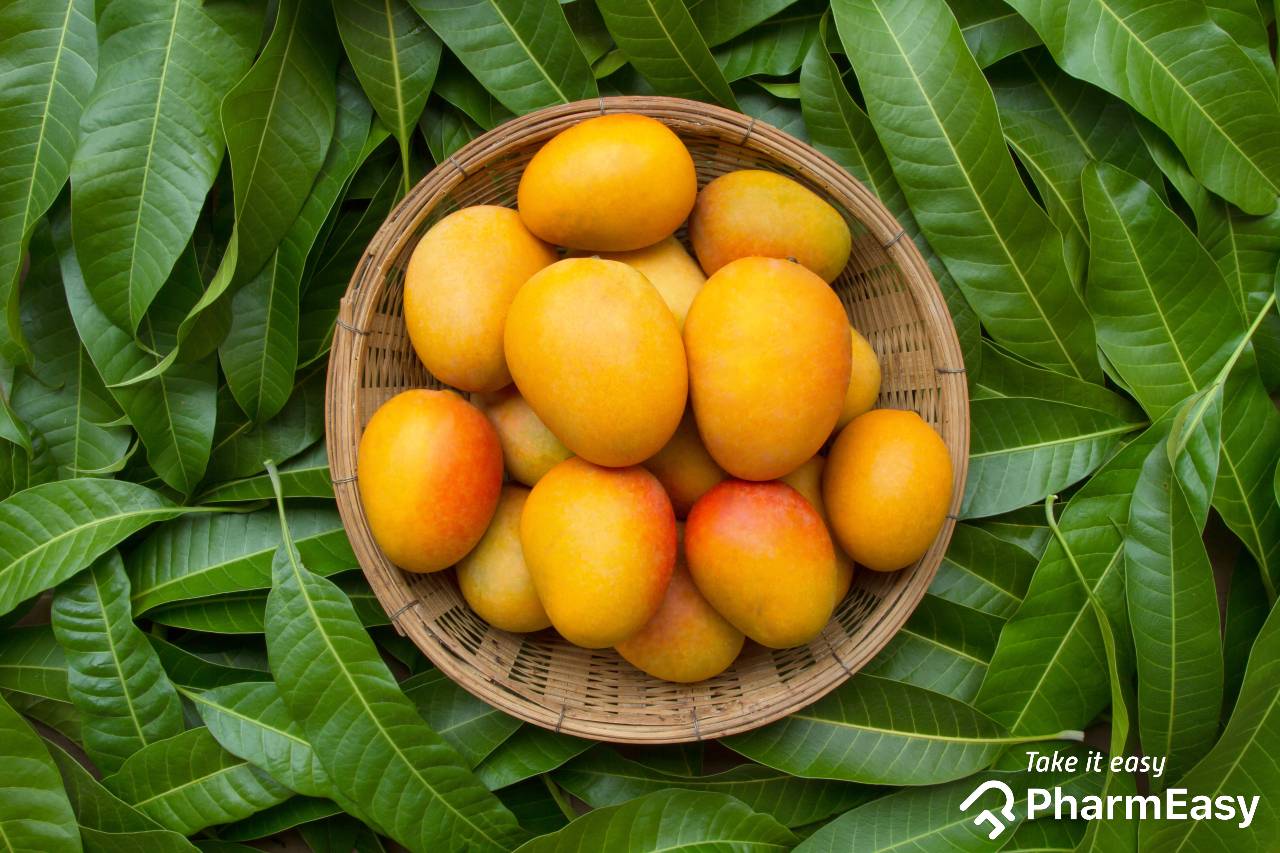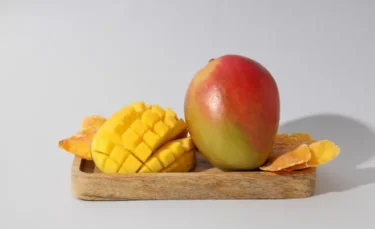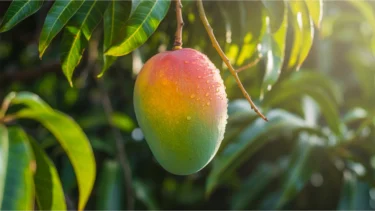Mango (Aam): Uses, Benefits, Side Effects by Dr. Smita Barode
By Dr Smita Barode +2 more

Get,

to manage your symptom
Get your,


4 Cr+ families
benefitted

OTP sent to 9988776655



You’ve successfully subscribed to receive
doctor-approved tips on
Whatsapp

Get ready to feel your best.

Hi There,
Download the PharmEasy App now!!


Register to Avail the Offer
Send OTPBy continuing, you agree with our Privacy Policy and Terms and Conditions

Hi There,
Sign up on PharmEasy now!!
Trusted by 4 crore+ families

OTP sent to 9988776655



You have unlocked 25% off on medicines




Code: NU25
By Dr Smita Barode +2 more
Table of Contents
Mangoes and summer seasons are a match made in heaven! The sweet and juicy taste coupled with countless health benefits justify why mango is called the “king of fruits”. Mangifera indica, mango or aam, is an important fruit in Ayurveda. It belongs to the genus Mangifera, and family Anacardiaceae which contains 30 different species. India ranks first among the major mango-producing countries. India is famous for its wide range of mango varieties, like Alphonso variety of Ratnagiri, Badami variety of Karnataka, Dasheri variety of Lucknow and Kesar variety of Gujarat to name a few. Mangoes are good for our taste buds and our health. They are also a rich source of fibre, vitamins, minerals and antioxidants like mangiferin and glucosyl xanthone. Let us read more about some mango benefits1.

Mango (Aam) is packed with various nutritional components that are given as follows. They are a good source of vitamins, minerals and antioxidants like mangiferin and glucosyl xanthone, and carotenes.
In my opinion, eating mangoes might be a way of giving your body a natural defence against certain diseases. Mangoes might have superpowers against certain types of cancers. Yes, it’s true! Thanks to the magical combination of beta-carotene and other special substances, mangoes might help against leukaemia and even slow down the progression of prostate and colon cancers11.
Dr. Siddharth Gupta, B.A.M.S, M.D (Ayu)
The mango shows numerous scientifically proven properties; some of these properties are mentioned below:
Some of the potential benefits of mango are described as follows:

Breast cancer is one of the most common cancers, leading to pre-mature death of females globally. Natural products are now becoming important sources for the discovery of anti-cancer agents. Mangifera indica may have the potential for the management of breast cancers. Banerjee et al. conducted a study in 2015 to assess the effect of mangoes on breast cancer xenografts in mice. This study3 showed that polyphenols like gallic acid, galloyl glycosides and gallotannins in mangoes might have a chemotherapeutic potential against breast cancer. This indicates that mangoes may help in managing breast cancer. However, more studies are required to support these claims.

Ulcerative colitis is a chronic inflammatory condition affecting the colon and rectum. Mangoes may help in reducing inflammation because of the presence of polyphenols like gallotannins and gallic acid. Kim et al. conducted a study4 in 2016 to assess mango’s anti-inflammatory effects in a preclinical colitis model. The results of this study4 showed that mango consumption might help in managing ulcerative colitis. However, more human studies are required to ascertain these claims.
From my perspective, eating mangoes can be a tasty solution to help with constipation. In a study12, it was found that munching on mangoes might actually improve the symptoms of constipation. Thus, mangoes may be a delicious way to keep things flowing smoothly in your digestive system.
Dr. Smita Barode, B.A.M.S, M.S.

Fruits and vegetables are a rich source of bioactive compounds which may help in managing the blood glucose level. The study conducted by Evans et al. 2014 showed that mangoes may reduce blood glucose levels in both females and males. The mango contains tocopherols, carotenoids, dietary fibre, ascorbic acid, gallic acid, quercetin and mangiferin. These biologically active compounds may help in normalising blood glucose levels. However, to claim all these benefits further research and confirmation are needed. If you suspect high blood glucose levels, consult your doctor and do not self-medicate5.

Mangoes, if consumed in moderate amounts, may help achieve healthy hair and nourished skin due to its high Vitamin A content. Additionally, mangoes may act as a natural sunblock by protecting our skin and hair from damage caused due to ultraviolet rays. Therefore, there is a possibility that the consumption of mango can benefit skin and hair, but we need more human studies6 to support these claims. If you have any skin and hair related problems, consult a doctor and do not self-medicate.

Macular degeneration is a common eye disorder which causes vision loss. Mangoes are rich in antioxidants like lutein, zeaxanthin and Vitamin A, which may help deal with macular degeneration. Mango is also rich in carotene which may help in vision. Thus, it may indicate that consuming mango may help manage macular degeneration. However, there is a lack of studies6 to support these claims.

Mangoes are a good source of nutrients in the diet. The nutrient intake of mango consumers vs. non-consumers was obtained from the NHANES database. It was observed that people who consumed mangoes had a higher intake of magnesium, potassium, folate, Vitamin A, C and E and dietary fibre compared to the non-consumers. This may indicate that the consumption of mangoes can help improve nutrient intake and diet quality. However, more studies7 need to be conducted to support these claims.

Though there are studies that show the benefits of Mango in various conditions, these are insufficient and there is a need for further studies to establish the true extent of the benefits of Mango on human health.
Let me tell you a secret. Mangoes are not just delicious; they’re also packed with a special ingredient called mangiferin! This fancy-sounding compound can be found in various parts of the mango fruit, like the peel, stalks, leaves, barks, kernel, and even the stone. Mangiferin might be just the secret weapon as it is high in antioxidants13.
Dr. Rajeev Singh, BAMS
This super versatile fruit can be used in the following ways:
You must consult a qualified doctor before taking any herbal supplements or mangoes in large quantities. Do not discontinue or replace an ongoing treatment of modern medicine with an ayurvedic/herbal preparation without consulting a qualified doctor.
Also Read: Jackfruit (Kathal): Uses, Benefits, Side Effects and More!
A few side effects related to the consumption of mango include:
However, if you experience any adverse reactions to mango, it is advised to discontinue its intake and immediately contact a doctor or your Ayurvedic physician who has prescribed it to you. They will be able to guide you appropriately for your symptoms.
Eating mango is beneficial if taken in moderate amounts. However, general precautions must be followed in the given conditions:
Also Read: Water Apple: Uses, Benefits, Side Effects, And More!
Mangoes inhibit the cytochrome P450 enzymes, which are known to metabolize certain drugs like warfarin, propranolol, theophylline, etc. Inhibition of these enzymes can alter the blood concentration of drugs metabolized by this pathway. Therefore, you must always seek the advice of your Ayurvedic physician about the possible interaction of raw mangoes with other drugs and follow the prescription thoroughly, as they will know your health condition and other medications you are taking10.
The scientific name of mango is Mangifera Indica and it belongs to the family Anacardiaceae1.
Animal cell line studies support the use of mangoes for managing breast cancers. However, more studies are needed to claim these effects. Thus, it is recommended to consult a doctor for proper treatment3.
Mango is also known as the “king of fruits”1.
Yes. As mango is a rich source of Vitamin A, it may improve vision. However, it is advised to consult a doctor for proper diagnosis for vision-related problems and not consider the consumption of mango as an alternative to modern medicine6.
Consumption of mangoes in excess can cause short-term gastrointestinal disorders like stomach pain and diarrhoea and allergies in allergy-prone individuals10.
Disclaimer: The information provided here is for educational/awareness purposes only and is not intended to be a substitute for medical treatment by a healthcare professional and should not be relied upon to diagnose or treat any medical condition. The reader should consult a registered medical practitioner to determine the appropriateness of the information and before consuming any medication. PharmEasy does not provide any guarantee or warranty (express or implied) regarding the accuracy, adequacy, completeness, legality, reliability or usefulness of the information; and disclaims any liability arising thereof.
Links and product recommendations in the information provided here are advertisements of third-party products available on the website. PharmEasy does not make any representation on the accuracy or suitability of such products/services. Advertisements do not influence the editorial decisions or content. The information in this blog is subject to change without notice. The authors and administrators reserve the right to modify, add, or remove content without notification. It is your responsibility to review this disclaimer regularly for any changes.
Comments

Leave your comment...
You may also like
Comments